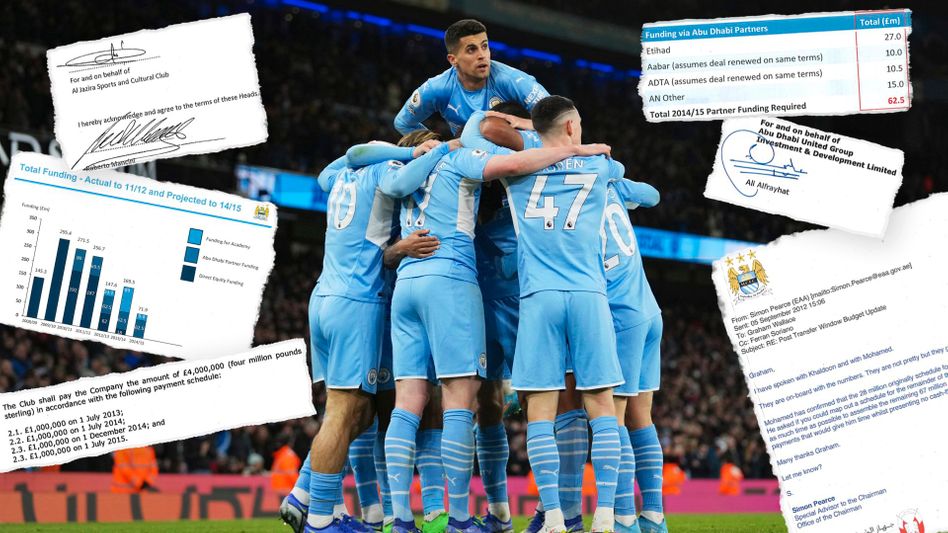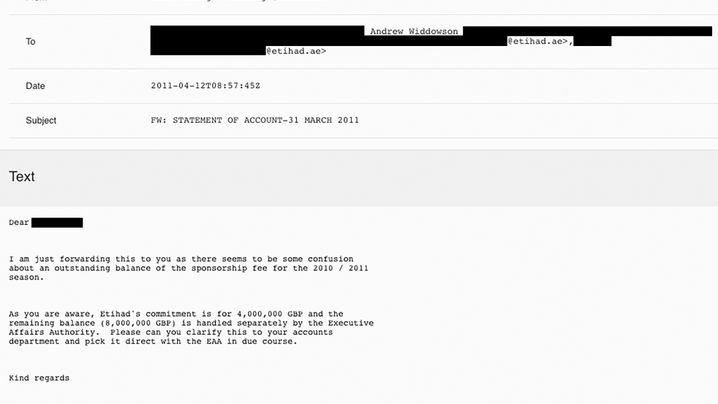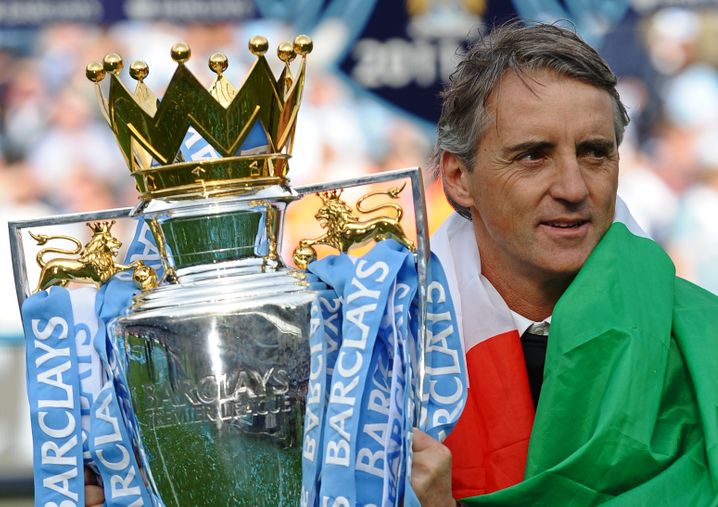A long article from Der Speigle on the financial shenanigans of Man City. It says that the Premier League have an ongoing investigation but I suspect that there will be a record fine and no other punishment given out.
Sponsorship Money – Paid for by the State
Since the sanctions imposed on Chelsea owner Roman Abramovich, links between English football clubs and authoritarian states have been in the spotlight. Internal documents show that Manchester City has received funding from a government agency in Abu Dhabi.
By Rafael Buschmann, Nicola Naber und Christoph Winterbach
07.04.2022, 16.11 Uhr
The Manchester City defensive wall is 7.4 meters (24 feet) high, 109 years old and cost around 244 million euros. It consists of defenders Rúben Dias, John Stones, João Cancelo and Kyle Walker, and it is one of the reasons why the team is currently on track to win its fourth English Championship in five years and is in the Champions League quarter finals.
No other football club in the world spends as much money on players as Manchester City. The CIES Football Observatory added up the transfer fees paid by the "Cityzens" over the last 10 years and arrived at a total of 1.7 billion euros. The team’s financial resources seem unlimited. After all, it is owned by Sheikh Mansour bin Zayed Al Nahyan, a member of the Abu Dhabi ruling family.
After the team from eastern Manchester spent decades wallowing in mediocrity, ManCity quickly became one of the most successful clubs in the world after Mansour took over control in 2008. In the Premier League, it looks as though the team can only be caught by FC Liverpool, with the two teams, coached by Pep Guardiola and Jürgen Klopp, set to meet on Sunday. And Manchester once again looks set to advance to the semifinals of the Champions League – one year after losing in the final to Premier League rival FC Chelsea.
But the proximity of the English club to the authoritarian nation of United Arab Emirates is a political issue. And recently, particularly since the political climate surrounding Chelsea owner Roman Abramovich changed for the worse following Russia’s invasion of Ukraine, the spotlight on state influence in professional soccer has shown more brightly.
Facing regular backlash, ManCity also invests significant amounts of money in defense off the field. Club leadership employs some of the best-known and most expensive lawyers in Britain in the attempt to ward off accusations made against the team’s business practices and to slow down investigations into rules violations.
And there is apparently no lack of such violations. New findings from DER SPIEGEL and the journalism network European Investigative Collaborations (EIC) show that the holding company behind Manchester City appears to have violated the rules by paying millions in fees to player agents and also orchestrated a secret, triangular deal to sign an underage player. Numerous documents provided by the whistleblower platform Football Leaks provide a deep look at the club’s inner workings and at government agencies in Abu Dhabi – sufficient to inflict a few chinks in ManCity’s juridical defensive wall.
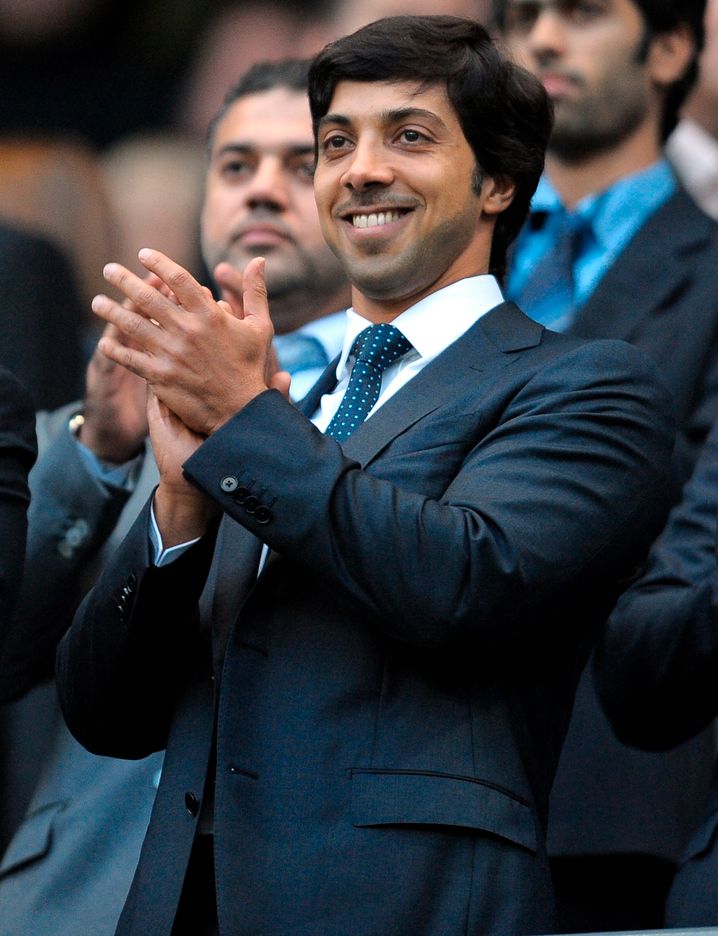
Bild vergrößern
Club owner Mansour has only attended a single Manchester City match – back in August 2010.
Foto: ANDREW YATES/ AFP
Like the Qataris’ investment in Paris Saint-Germain and the Saudi Arabian Public Investment Fund’s purchase of Newcastle United, the billions of euros spent on ManCity by UAE is primarily, it would seem, an attempt to use success on the football pitch to improve the country’s image. The UAE, after all, allows no political dissent at home, disregards human rights and is under suspicion of having committed war crimes in the ongoing violence in Yemen – which the UAE denies. The team owners are apparently willing to pay any price necessary to appear in the best possible light on the stage of elite football. And it looks suspiciously as though one of the richest nations in the world is financing the team’s operations, using hidden payments to circumvent spending rules.
In 2020, the Union of European Football Associations (UEFA) banned the team from the Champions League for two years due to revelations published by DER SPIEGEL. Manchester City, represented by almost a dozen top lawyers, appealed the ruling at the Court of Arbitration for Sport (CAS). UEFA lost the case, despite the existence of clear evidence for the questionable business practices employed by Manchester City.
Money from the Government
The company Abu Dhabi United Group Investment & Development (ADUG) belongs to Sheikh Mansour and was the official owner of Manchester City from 2008 until last year, when the team was transferred to a different company owned by Mansour. Officials in UAE have consistently insisted that ADUG is a purely private company and Mansour’s involvement with the English team is a completely private investment. In testimony before CAS, a legal representative of the Finance Ministry in Abu Dhabi said that ADUG "is completely unconnected" to the government of UAE or the Emirate of Abu Dhabi.
Research in the Football Leaks documents has revealed, however, that payments from ADUG to the club were cleared by a state office. According to internal documents, the Executive Affairs Authority (EAA), an Abu Dhabi government agency focused on providing strategic guidance, obviously manages the accounts belonging to ADUG. Agency chief Khaldoon Al Mubarak, the de facto prime minister of Abu Dhabi, is head of the state investment fund and is also chairman of Manchester City. He apparently approved money flows that were controlled by the government before ending up in the accounts of the football team. Payment requests for agent fees were sent to the EAA’s general counsel, with ManCity sending an invoice for the sponsorship company Etisalat to Omar Awad, the finance director of the government agency. "Omar works for the EAA and is very important and helpful in facilitating our financial administration of City," wrote Simon Pearce, a club board member, to a colleague in January 2014.
Were such a situation to play out in Germany, it might look like this: The state-owned railway company Deutsche Bahn would be FC Bayern Munich's main sponsor, but the club would send invoices for sponsorship money to a senior official in the Chancellery before then writing emails praising the financial services provided to the club by the government official. A rather absurd idea.
At Manchester City, the dividing lines between an authoritarian government and a private football club have become almost indistinguishable. Neither Manchester City nor the EAA officials responded to a DER SPIEGEL request for comment. The new revelations could create significant problems for the Premier League leaders. Already, the English football league has spent years investigating Manchester City, largely out of the public eye. According to information obtained by DER SPIEGEL, that investigation is focusing on three primary allegations.
Evidence of Manchester City's close ties with the Abu Dhabi government can be found in this file:
Dossier: Manchester City's Ties to the State
Download
PDF — kB
1. Dealing with Underage Players
There are special rules in place for the protection of underage football talents. Clubs are forbidden, for example, from transferring players under the age of 16 across international borders. And they are not allowed to provide monetary payments to underage players, their parents or their agents.
Numerous clubs have spent years routinely ignoring these provisions. Indeed, FIFA even temporarily banned FC Chelsea and Real Madrid from the transfer market due to such transgressions. Manchester City has had to pay both the English Football Association and FIFA at least 300,000 pounds for violations of the youth protection rules.
DER SPIEGEL has in the past reported on hidden payments apparently made by Manchester City to the agent of Jadon Sancho, who was 14 years old at the time. In a case that has thus far flown under the radar, the club transferred 14-year-old Brahim Díaz from Málaga CF to Manchester in late 2013 and apparently trained him in their academy for two years before being officially allowed to register him.
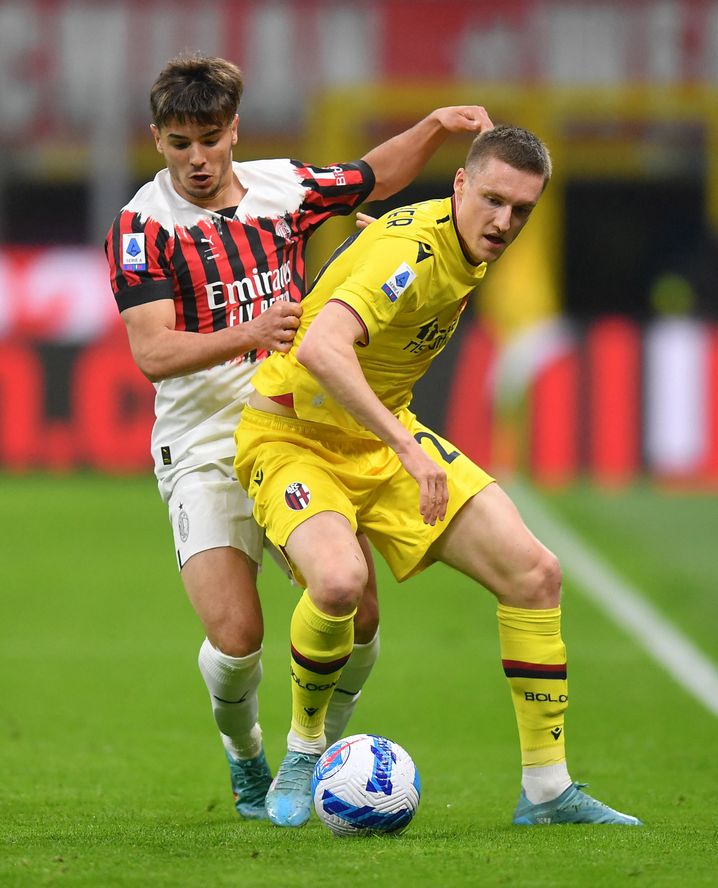
Bild vergrößern
Brahim (left) now plays for AC Milan. He was transferred in late 2013 from Málaga to Manchester.
Foto: DANIELE MASCOLO / REUTERS
When a player is transferred, training compensation is normally due for the original home club. However, Manchester City brought Brahim to England at a time when no official transfer was possible. Accordingly, it would likely have been difficult for the club to explain why they transferred money to the club in Málaga.
In club leadership emails, it becomes clear that ADUG was prepared to take care of the training compensation relating to Brahim’s transfer, but apparently wanted to conceal its involvement. According to the documents, the Sheikh’s company agreed to pay a 360,000-euro bill owed to Brahim’s youth club through an intermediary agency. The documentation indicates that ADUG paid the money to a company in Barcelona, which then forwarded the money onward to the Spanish club. Apparently Manchester City, like many other top clubs, used creative tricks to circumvent the rules protecting minors.
The internal documents also show that Brahim’s case wasn’t the only instance in which ADUG jumped in to cover the bills. Between 2010 and 2015, the Sheikh’s company apparently paid at least 4 million euros and 4 million pounds to a company belonging to the agent of club legend Yaya Touré. According to the emails, the payments were apparently cleared by ManCity CEO Ferran Soriano and team chairman Khaldoon Al Mubarak. The board member Simon Pearce apparently guided the payments from the Abu Dhabi government agency.
None of the clubs, companies and managers involved in these deals have provided comment on the allegations.
A dossier with evidence on this topic can be found here:
Dossier: Questionable Deals with Underage Players
DownloadFall Jadon Sancho
PDF — kB
DownloadFall Brahim
PDF — kB
2. Sponsorship M
Sponsorship Money – Paid for by the State
Since the sanctions imposed on Chelsea owner Roman Abramovich, links between English football clubs and authoritarian states have been in the spotlight. Internal documents show that Manchester City has received funding from a government agency in Abu Dhabi.
By Rafael Buschmann, Nicola Naber und Christoph Winterbach
07.04.2022, 16.11 Uhr
The Manchester City defensive wall is 7.4 meters (24 feet) high, 109 years old and cost around 244 million euros. It consists of defenders Rúben Dias, John Stones, João Cancelo and Kyle Walker, and it is one of the reasons why the team is currently on track to win its fourth English Championship in five years and is in the Champions League quarter finals.
No other football club in the world spends as much money on players as Manchester City. The CIES Football Observatory added up the transfer fees paid by the "Cityzens" over the last 10 years and arrived at a total of 1.7 billion euros. The team’s financial resources seem unlimited. After all, it is owned by Sheikh Mansour bin Zayed Al Nahyan, a member of the Abu Dhabi ruling family.
After the team from eastern Manchester spent decades wallowing in mediocrity, ManCity quickly became one of the most successful clubs in the world after Mansour took over control in 2008. In the Premier League, it looks as though the team can only be caught by FC Liverpool, with the two teams, coached by Pep Guardiola and Jürgen Klopp, set to meet on Sunday. And Manchester once again looks set to advance to the semifinals of the Champions League – one year after losing in the final to Premier League rival FC Chelsea.
But the proximity of the English club to the authoritarian nation of United Arab Emirates is a political issue. And recently, particularly since the political climate surrounding Chelsea owner Roman Abramovich changed for the worse following Russia’s invasion of Ukraine, the spotlight on state influence in professional soccer has shown more brightly.
Facing regular backlash, ManCity also invests significant amounts of money in defense off the field. Club leadership employs some of the best-known and most expensive lawyers in Britain in the attempt to ward off accusations made against the team’s business practices and to slow down investigations into rules violations.
And there is apparently no lack of such violations. New findings from DER SPIEGEL and the journalism network European Investigative Collaborations (EIC) show that the holding company behind Manchester City appears to have violated the rules by paying millions in fees to player agents and also orchestrated a secret, triangular deal to sign an underage player. Numerous documents provided by the whistleblower platform Football Leaks provide a deep look at the club’s inner workings and at government agencies in Abu Dhabi – sufficient to inflict a few chinks in ManCity’s juridical defensive wall.

Bild vergrößern
Club owner Mansour has only attended a single Manchester City match – back in August 2010.
Foto: ANDREW YATES/ AFP
Like the Qataris’ investment in Paris Saint-Germain and the Saudi Arabian Public Investment Fund’s purchase of Newcastle United, the billions of euros spent on ManCity by UAE is primarily, it would seem, an attempt to use success on the football pitch to improve the country’s image. The UAE, after all, allows no political dissent at home, disregards human rights and is under suspicion of having committed war crimes in the ongoing violence in Yemen – which the UAE denies. The team owners are apparently willing to pay any price necessary to appear in the best possible light on the stage of elite football. And it looks suspiciously as though one of the richest nations in the world is financing the team’s operations, using hidden payments to circumvent spending rules.
In 2020, the Union of European Football Associations (UEFA) banned the team from the Champions League for two years due to revelations published by DER SPIEGEL. Manchester City, represented by almost a dozen top lawyers, appealed the ruling at the Court of Arbitration for Sport (CAS). UEFA lost the case, despite the existence of clear evidence for the questionable business practices employed by Manchester City.
Money from the Government
The company Abu Dhabi United Group Investment & Development (ADUG) belongs to Sheikh Mansour and was the official owner of Manchester City from 2008 until last year, when the team was transferred to a different company owned by Mansour. Officials in UAE have consistently insisted that ADUG is a purely private company and Mansour’s involvement with the English team is a completely private investment. In testimony before CAS, a legal representative of the Finance Ministry in Abu Dhabi said that ADUG "is completely unconnected" to the government of UAE or the Emirate of Abu Dhabi.
Research in the Football Leaks documents has revealed, however, that payments from ADUG to the club were cleared by a state office. According to internal documents, the Executive Affairs Authority (EAA), an Abu Dhabi government agency focused on providing strategic guidance, obviously manages the accounts belonging to ADUG. Agency chief Khaldoon Al Mubarak, the de facto prime minister of Abu Dhabi, is head of the state investment fund and is also chairman of Manchester City. He apparently approved money flows that were controlled by the government before ending up in the accounts of the football team. Payment requests for agent fees were sent to the EAA’s general counsel, with ManCity sending an invoice for the sponsorship company Etisalat to Omar Awad, the finance director of the government agency. "Omar works for the EAA and is very important and helpful in facilitating our financial administration of City," wrote Simon Pearce, a club board member, to a colleague in January 2014.
Were such a situation to play out in Germany, it might look like this: The state-owned railway company Deutsche Bahn would be FC Bayern Munich's main sponsor, but the club would send invoices for sponsorship money to a senior official in the Chancellery before then writing emails praising the financial services provided to the club by the government official. A rather absurd idea.
At Manchester City, the dividing lines between an authoritarian government and a private football club have become almost indistinguishable. Neither Manchester City nor the EAA officials responded to a DER SPIEGEL request for comment. The new revelations could create significant problems for the Premier League leaders. Already, the English football league has spent years investigating Manchester City, largely out of the public eye. According to information obtained by DER SPIEGEL, that investigation is focusing on three primary allegations.
- Underage players were allegedly pressured to sign contracts with Manchester City through monetary payments, in violation of the rules.
- Club sponsors in Abu Dhabi are suspected of having provided only a portion of their payments to the club themselves, with the majority apparently coming from Sheikh Mansour himself.
- Roberto Mancini, who is currently the trainer for the Italian national team but who spent the years from 2009 to 2013 as the trainer for ManCity, is thought to have received a significant portion of his compensation secretly by way of a fictitious consultancy contract.
Evidence of Manchester City's close ties with the Abu Dhabi government can be found in this file:
Dossier: Manchester City's Ties to the State
Download
PDF — kB
1. Dealing with Underage Players
There are special rules in place for the protection of underage football talents. Clubs are forbidden, for example, from transferring players under the age of 16 across international borders. And they are not allowed to provide monetary payments to underage players, their parents or their agents.
Numerous clubs have spent years routinely ignoring these provisions. Indeed, FIFA even temporarily banned FC Chelsea and Real Madrid from the transfer market due to such transgressions. Manchester City has had to pay both the English Football Association and FIFA at least 300,000 pounds for violations of the youth protection rules.
DER SPIEGEL has in the past reported on hidden payments apparently made by Manchester City to the agent of Jadon Sancho, who was 14 years old at the time. In a case that has thus far flown under the radar, the club transferred 14-year-old Brahim Díaz from Málaga CF to Manchester in late 2013 and apparently trained him in their academy for two years before being officially allowed to register him.

Bild vergrößern
Brahim (left) now plays for AC Milan. He was transferred in late 2013 from Málaga to Manchester.
Foto: DANIELE MASCOLO / REUTERS
When a player is transferred, training compensation is normally due for the original home club. However, Manchester City brought Brahim to England at a time when no official transfer was possible. Accordingly, it would likely have been difficult for the club to explain why they transferred money to the club in Málaga.
In club leadership emails, it becomes clear that ADUG was prepared to take care of the training compensation relating to Brahim’s transfer, but apparently wanted to conceal its involvement. According to the documents, the Sheikh’s company agreed to pay a 360,000-euro bill owed to Brahim’s youth club through an intermediary agency. The documentation indicates that ADUG paid the money to a company in Barcelona, which then forwarded the money onward to the Spanish club. Apparently Manchester City, like many other top clubs, used creative tricks to circumvent the rules protecting minors.
The internal documents also show that Brahim’s case wasn’t the only instance in which ADUG jumped in to cover the bills. Between 2010 and 2015, the Sheikh’s company apparently paid at least 4 million euros and 4 million pounds to a company belonging to the agent of club legend Yaya Touré. According to the emails, the payments were apparently cleared by ManCity CEO Ferran Soriano and team chairman Khaldoon Al Mubarak. The board member Simon Pearce apparently guided the payments from the Abu Dhabi government agency.
None of the clubs, companies and managers involved in these deals have provided comment on the allegations.
A dossier with evidence on this topic can be found here:
Dossier: Questionable Deals with Underage Players
DownloadFall Jadon Sancho
PDF — kB
DownloadFall Brahim
PDF — kB
2. Sponsorship M


